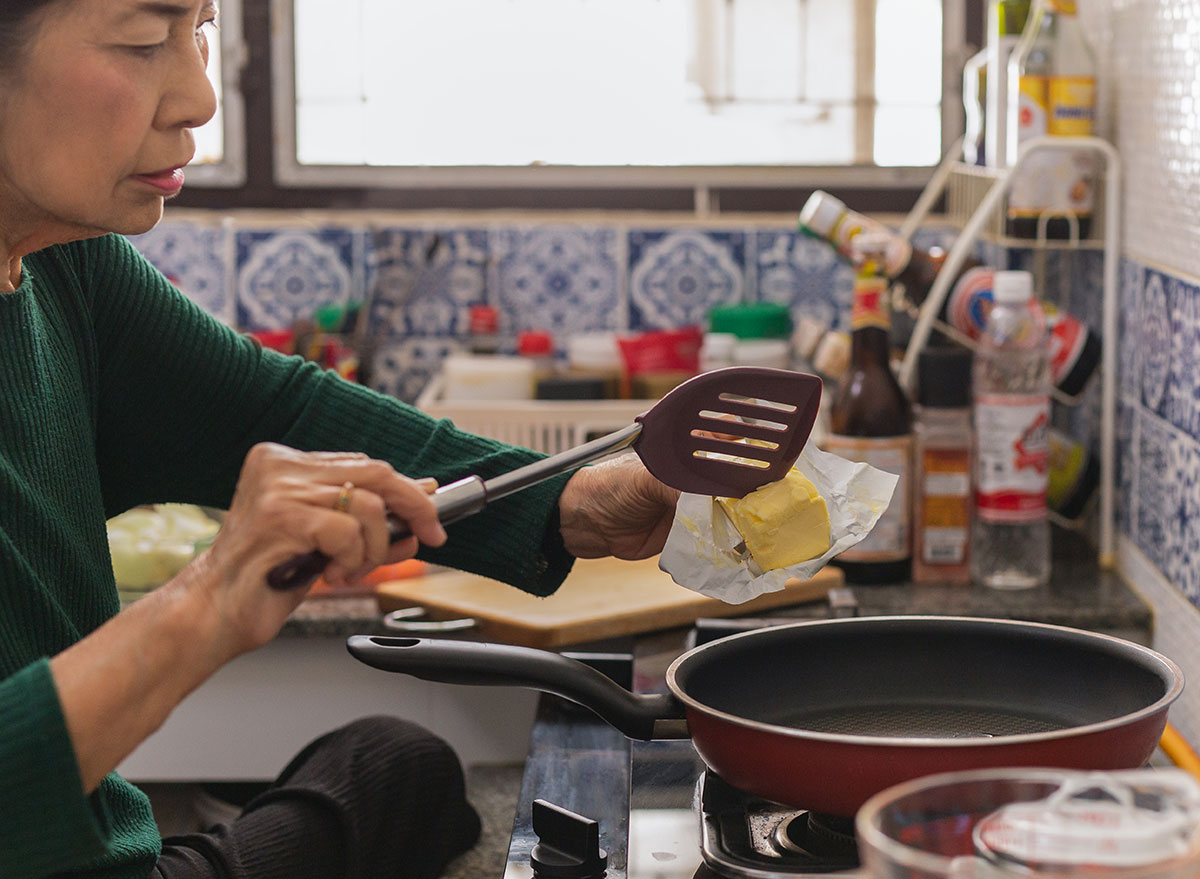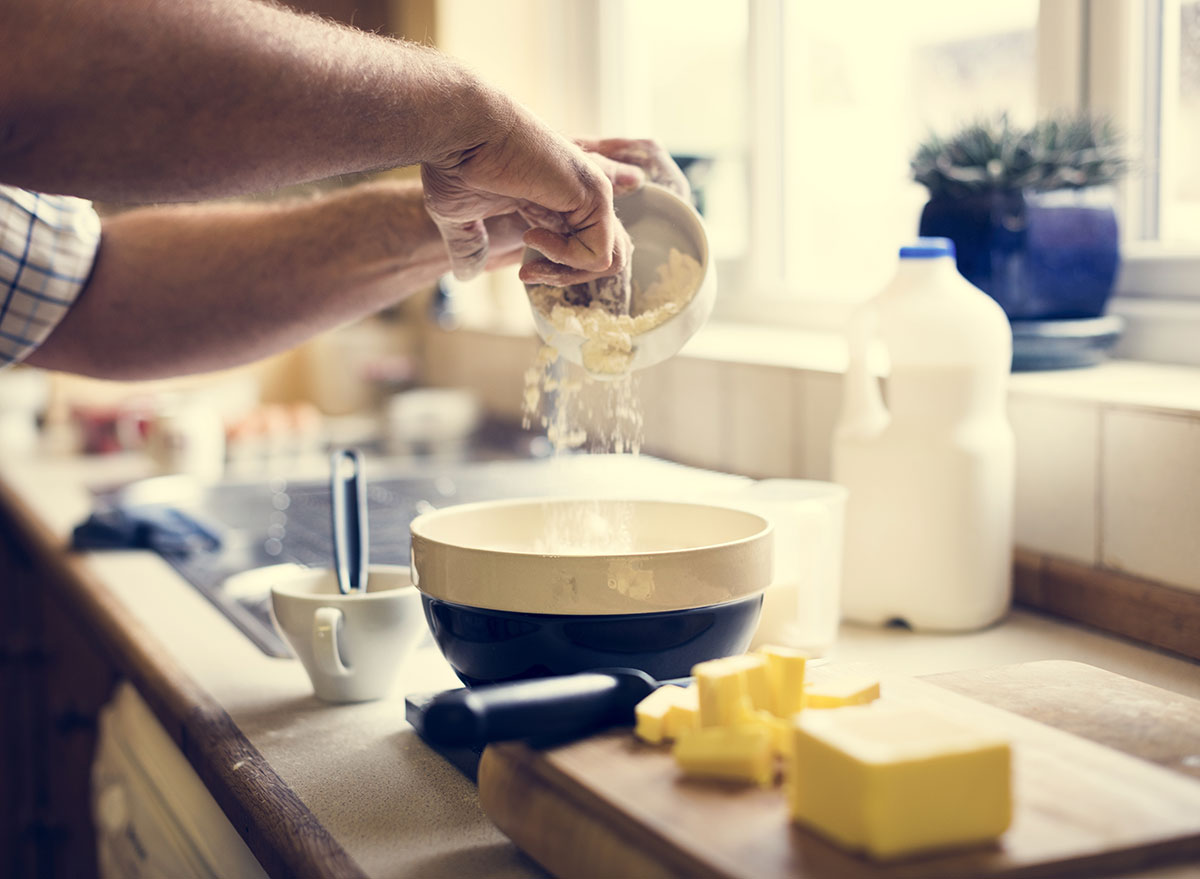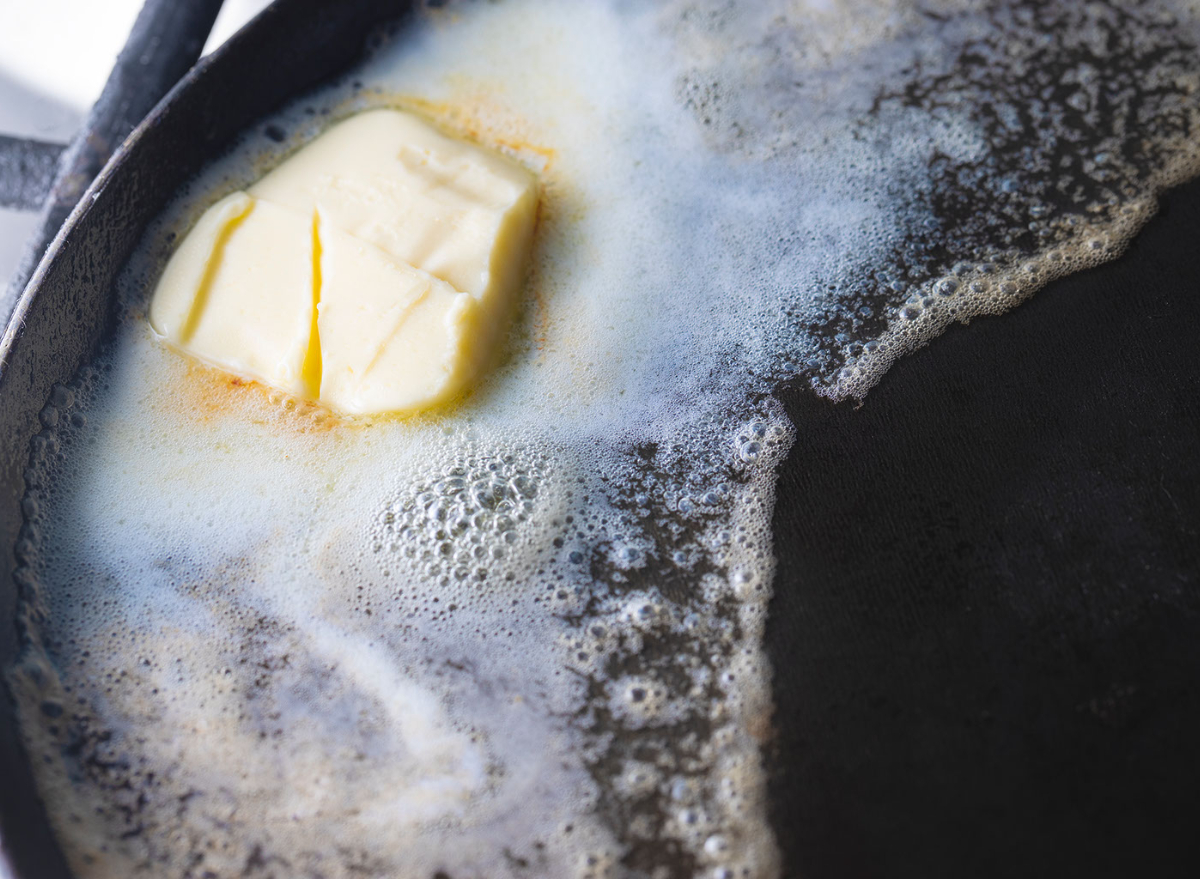One Major Side Effect of Cooking With Butter, Say Dietitians

Julia Child famously once said, "with enough butter, anything is good." She was well known for always using butter in her recipes—even using over 700 pounds of butter while filming her show Baking with Julia. She always used real butter—never the fake stuff. And while there are no chemicals in butter compared to margarine and other butter-like spreads, cooking with butter all the time can have one major side effect on your body that you should be aware of.
According to a few dietitians, cooking with butter can increase your risk of developing chronic diseases. But how much butter would cause this? And is it bad to cook with butter in general?
We took a look at the science behind why we should all pay attention to this one major side effect of cooking with butter, and if you're looking for even more healthy tips, check out our list of The 7 Healthiest Foods to Eat Right Now.
Is butter bad for you?

Essentially—no.
Butter is a dairy product made of fat from churning cream from cows. Because it's coming from cows, butter is surprisingly full of vitamins and minerals that can be helpful for your body. Butter is rich in vitamins A, E, B12, and K, and also contains lauric acid (which helps with treating infections).
Studies have also shown how butter can help improve digestion, fight cancer, and yes, even help you lose weight.
So if butter can help you in many ways, why do so many look at butter as the enemy? It all comes back to portion control and how much butter you are consuming. Cooking with it can easily increase the amount of butter you consume, which is why it's important to keep this one major side effect in mind.
Here's What Happens To Your Body When You Eat Butter.
How much butter is too much?

Portion control and eating fatty foods in moderation is the key to staying healthy, especially when it comes to butter. Cooking with a small amount of butter once in a while can be fine, but cooking with a lot of it consistently over time can cause adverse side effects.
"Unless you have an issue with fat digestion (for example if you have had bariatric surgery or have had your gallbladder removed), side effects will be minimal to none at the moment when cooking with butter," says Ricci-Lee Hotz, MS, RDN at a Taste of Health and Expert at Testing.com. "[However], in the long term, if you cook with butter consistently, you may end up experiencing issues with high cholesterol, heart disease, and weight gain/obesity if used in excess."
While butter does contain a few key vitamins, it also contains saturated fat—a type of dietary fat that can raise the levels of cholesterol in your blood, according to the American Heart Association. High levels of cholesterol in the blood over time can lead to the development of cardiovascular diseases.
One tablespoon of butter is 100 calories and includes 7 grams of saturated fat. The AHA says only 5% to 6% of your calories should come from saturated fat, which is around 13 grams for the average 2,000 calorie diet. This means using 1 tablespoon of butter would account for 54% of your saturated fat intake for the day.
All in all, if you plan on spreading butter on anything you eat during the day—like a slice of toast—then also cooking with butter can easily cause you to overdo it on your saturated fat intake for the day, which is what leads to this one major side effect.
Here's why saturated fat is considered The Worst Fat To Eat If You're Trying To Lose Weight/
How cooking with too much butter can lead to disease.

If you plan on using butter in other parts of your diet, then cooking with butter not only increases the amount of butter you end up consuming but can easily increase your risk due to the high amount of saturated fat and increase in cholesterol.
"Butter is high in saturated fat, which can contribute to heart disease as it has been known to elevate your cholesterol, "Lisa Young, PhD, RDN is the author of Finally Full, Finally Slim, and adjunct professor of nutrition at NYU. "Believe it or not, cooking your eggs in butter is more of a problem than eating the eggs. I recommend cooking oil instead."
"When cooking with butter one major side effect is you increase your risk for chronic conditions," Trista Best, MPH, RD, LD from Balance One Supplements. "You are increasing your cholesterol, triglycerides, and the fat content of the meal itself. This puts you at risk for chronic conditions like obesity, heart disease, and even diabetes."
Be smart about your butter consumption!

So if you would prefer to use butter elsewhere, like on your toast or in something you are baking, then why also cook with it when there are other healthier cooking oil options?
"Simply put, butter is most often an unnecessary ingredient to cook with," says Best. "Most sauteeing can be done with water or a low fat sauce like soy sauce or liquid aminos. There are a few effective ways to replace butter in the baking process as well."
All in all, consuming a small amount of butter won't do damage to your body—it's overdoing it on your butter intake that can cause this one major side effect. It all depends on how you want to consume your allotted amount of butter. Do you want to cook with it? Or would you rather spread it on toast? It's up to you!
Get even more healthy eating tips straight to your inbox by signing up for our newsletter! After, read these next:
- One Major Side Effect of Using Cooking Spray, Say Dietitians
- Cooking With This Oil Lowers Heart Disease Risk and Cholesterol, New Study Says
- 50 Worst Cooking Mistakes That Are Ruining Your Food







